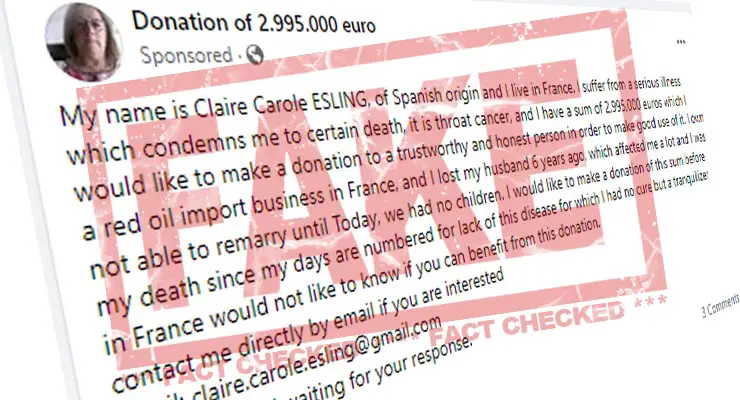Old-school advance fee scams now using Facebook Sponsored Ads
With Facebook’s advertising platform already rife with various scams, it appears even the classic advance fee scammers are now also getting their well-trodden schemes published on Sponsored Ads.
It’s no secret that all types of crooks have been using Facebook Sponsored Ads to force their criminal wares onto unsuspected Facebook users. This has included crooks peddling counterfeit goods and crooks using celebrities to lure victims to crypto-investment scams.
It isn’t difficult for those versed in online crime to spot these scams from many miles away. And that’s why it’s disappointing that these scam ads manage to make their way onto Facebook’s advertisement platform, and more disappointing still that Facebook often refuses to remove them even after they’re reported.
It would be prudent to think that crooks that exploit Facebook’s ad platform would inevitably start making their scams more sophisticated to try and increase their chances of fooling Facebook into accepting and publishing their scam ads.
But so bad has Facebook been at detecting and removing scams, the opposite appears to be the case, with advance fee crooks now using Sponsored Ads to force some pretty old-school scams down the throats of Facebook users. Take the below Facebook ad, for example.
We’d like to think that almost every single one of our readers will recognise the archetypal hallmarks to what is a classic and tired scam. The “dying person” looking to offload millions of dollars before their death onto one lucky person, and that lucky person is you! But wait, before you can get your hands on the life-changing cash, you just need to fork out a few hundred to pay for courier fees. And handling fees. And notary signing costs. Etc. etc. It’s called advance fee fraud, and it actually started targeting victims back in the early days of email. That is literally decades ago.
Sponsored Content. Continued below...
It is the latest demonstration of how inept Facebook is at preventing scam adverts that even scams that have been around for decades are making their way onto the Sponsored Ads platform.
More disconcerting still is that the page that published the advert was created less than 24 hours ago, showing just how easy it is for almost anyone to publish almost anything onto Facebook’s Sponsored Ads. And Facebook will gladly absorb all ads that comes its way. The social networking platform is – of course – making money from these scams.
If Facebook was serious about removing these types of patent scams – as they claim during their hearings in front of Congress – they would have implemented some meaningful solutions by now.
This could include –
- Preventing newly created Facebook Pages from being able to automatically publish adverts without a human review
- Introducing a “trusted advertiser” feature whereby only advertisers that have verified themselves can automatically publish adverts.
- Preventing new adverts from being created that are identical to scam adverts that have previously been identified as scams.
- Increased human moderation and less reliance on AI
Sadly Facebook does not appear to be doing any of the above, and scams continue to run rampant on the platform, and now the advance fee scammers of yore are getting in on the action.
Continued below...
Thanks for reading, we hope this article helped, but before you leave us for greener pastures, please help us out.
We're hoping to be totally ad-free by 2025 - after all, no one likes online adverts, and all they do is get in the way and slow everything down. But of course we still have fees and costs to pay, so please, please consider becoming a Facebook supporter! It costs only 0.99p (~$1.30) a month (you can stop at any time) and ensures we can still keep posting Cybersecurity themed content to help keep our communities safe and scam-free. You can subscribe here
Remember, we're active on social media - so follow us on Facebook, Bluesky, Instagram and X

